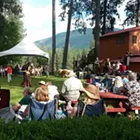Last summer, we went to investigate claims of there being an Amish bakery north of town with the best pies this side of the Rockies. We found the place, and were immediately charmed by the ramshackle farmhouse, the horse-drawn carriage out in front, the four or five dozen chickens pecking in the yard and the children, who ducked behind shrubs or ran behind the house the minute our photographer reached for her camera. As I interviewed the children's mother (and head baker), I just assumed they grew everything they needed for baking or belonged to some special Amish supply network
"How do you get all your supplies for baking, like your flour and spices and so on?" I asked.
"Well," she replied, a flicker of something that looked like suppressed laughter crossing her face, "they have a lot of really nice stores in town."
That moment of inept questioning on my part showed me how easy it is to stumble around inside your own preconceived notions. Such a realization is subtly at the heart of the MAC's first new show this fall, "Hutterite: A World of Grace." Taken in the early 1990s as New York photographer Kristin Capp was slowly allowed into the largely hidden world of a Hutterite community near Soap Lake, Wash., the 50 or so black-and-white photographs on exhibit convey the hardworking, close-to-the-earth lives of modern day Hutterites. Women in plain dress with clean white bonnets hoist cabbages like waitress trays. Men take a momentary break from agricultural work while children play in the shadows of enormous grain elevators. Through it all run long stretches of empty black highway and broad sweeps of farmland.
While the exhibit would seem to be a natural for Spokane, just a hundred or so miles away, it has never been shown here until now. Jochen Wierich, curator of art for the MAC, heard about the show's confirmation at his soon-to-be workplace while he was still "back east" and arranged a meeting with Capp, who will be here for the opening on Sept. 19.
"I had the chance to visit her in her studio, and we talked for two hours," he says. "It's a great thing for us. I think that, especially with this kind of show, the viewer is hungry to hear more of the story behind the pictures -- for instance, how did she develop that level of trust?"
Such trust is one of the most intriguing things about the exhibit. Hutterites are Anabaptist, one of a handful of similar religious groups across the U.S., including the Mennonites and the Amish. They speak an archaic German dialect and live by rules that haven't changed much since the days of Reformation. "They are very reluctant to be photographed. They have very strict rules about 'graven images'," says Wierich.
Capp earned their trust, discovering that the Hutterites' relationship with such modern conveniences as photography is not as simple as one might think. Wierich describes a photo in the exhibit of a man, holding a photo of himself as a young man.
"These photos make us question our notions about how here, this is a community entirely untouched by progress," he explains. "By showing this photograph intruding into their world, you come to realize that just like us, they would use photography to hold onto their memories."
This smaller example, in fact, illustrates something quietly asserted in the exhibit as a whole. There is nothing so overt as showing Hutterites loading clothes into a brand new Whirlpool or tossing back icy cold bottles of Coke, but neither are they strictly idealized versions of quilting bees, horse-drawn covered wagons and cozy cow-milking at dawn.
"I think that in some ways we are asked to question our preconceived notions about the Hutterites and how we see them as a farming community that lives in the ways of the 16th century, or that they're a community entirely untouched by progress," Wierich offers. "There are stereotypes that we associate with these communities. These photos don't entirely dismiss that or reverse that. What they do is they make us look at this culture in a very nuanced, differentiated way."















